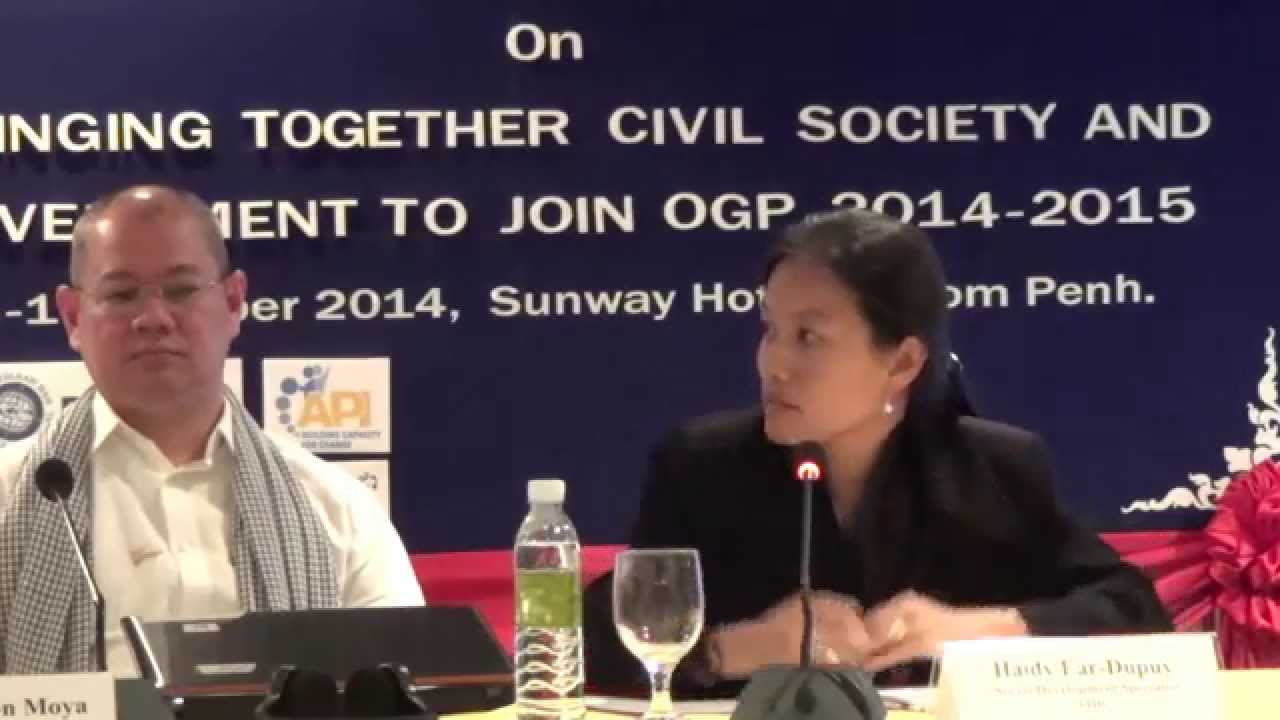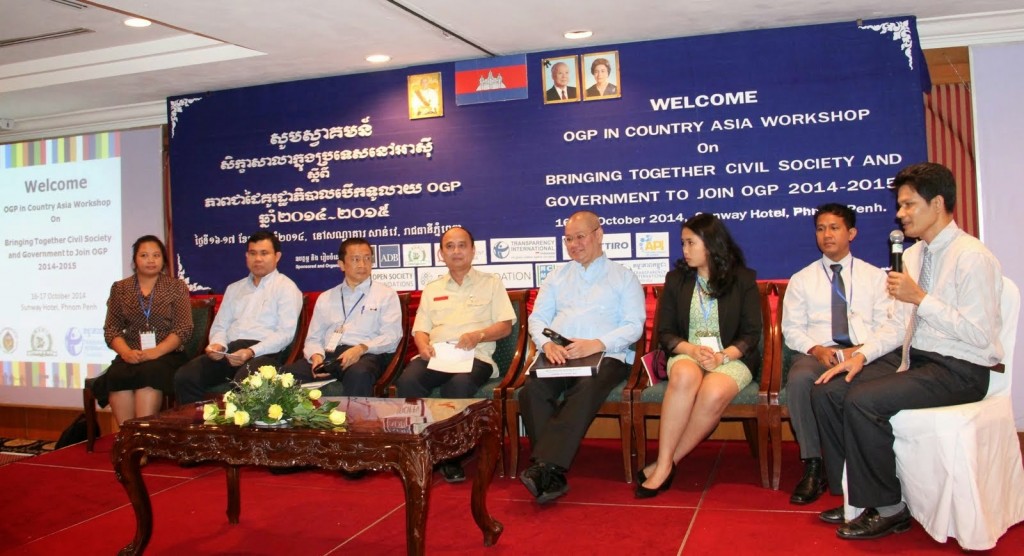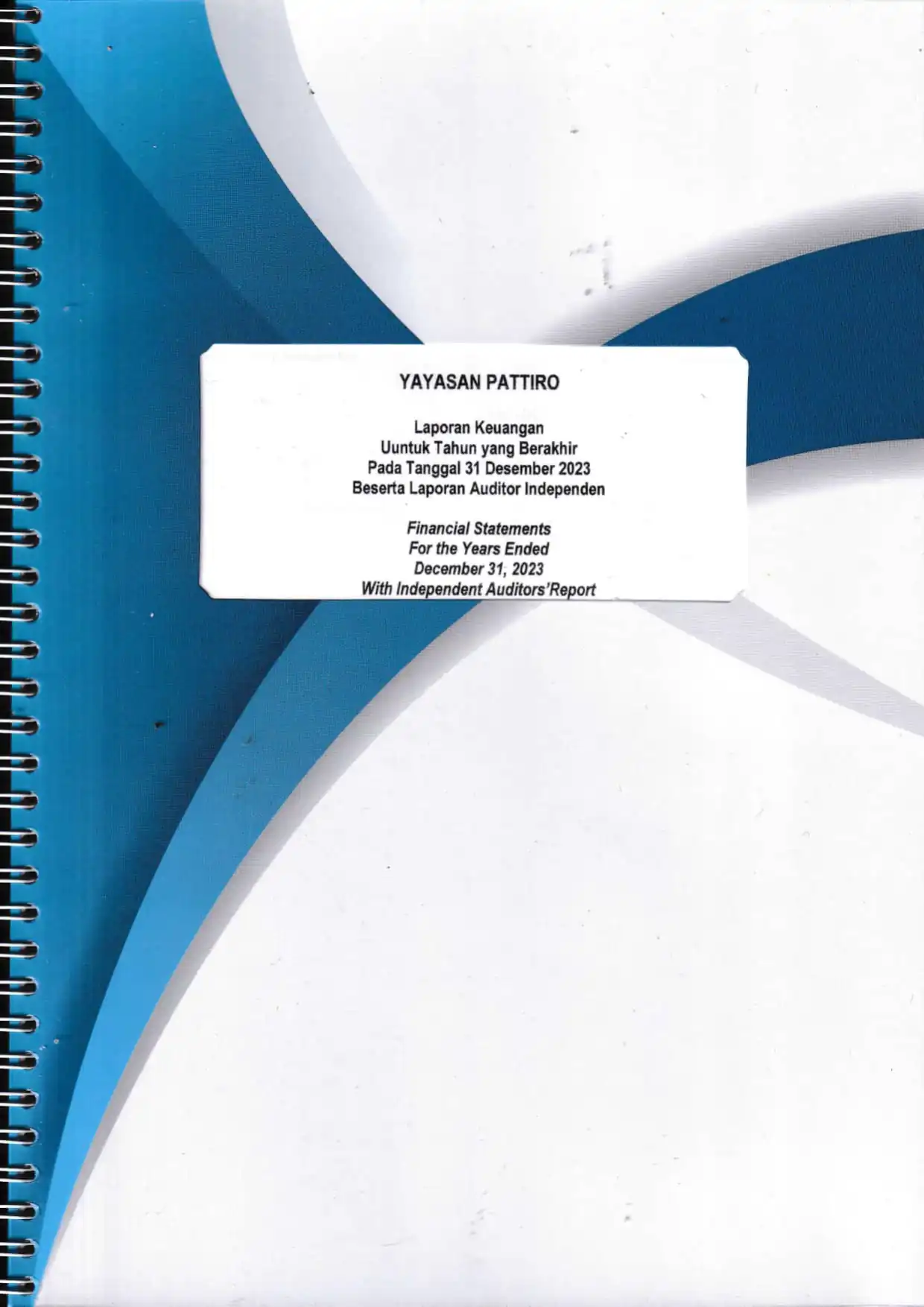
After Malaysia, it was the turn of Cambodia to host the OGP Workshop in Asia Pacific countries. Taken place in Sunway Hotel, Phnom Penh, the OGP Workshop in Cambodia is not only attended by the CSOs from Indonesia, Philippine, and Cambodia, but also attended by the representative of CSOs from Vietnam coordinated by Toward Transparency Vietnam. Representatives of the government of Cambodia also attended the workshop such as the members of the parliament, Mr. Undersecretary of State and Deputy Head of the National Committee for Sub-National Democratic Development Secretariat (NCDDS) Ngan Chamroeun, the Head of Anti-Corruption Unit of Cambodia Dr. Om Yentieng, representatives from the Ministry of Education, Youth and Sport and the Ministry of Foreign Affairs and International. In addition to that, Mr. Undersecretary – CIO of the Philippine Department of Budget and Management Richard Bon Moya as the representative of the government of Philippine and Karina Kusumawardani the Associate Director of UKP4 as the representative of Indonesian government was also present along with the representative of the donors like Mr. Alexander Irwan from Ford Foundation, Ms. Haidy Ear-Dupuy from Asia Development Bank (ADB) and others from GIZ, Oxfam, and USAID.
Since Cambodia is still in the reforming process, its CSOs find it necessary to organize this workshop – just like what they have expressed in the OGP Asia Pacific Regional Conference in Bali, last Mei 2014. The purposes of this workshop as Mr. Soeung Saroeun the Executive Director of CCC said are to disseminate OGP’s values, mechanisms, goals and communities to the governments and CSO communities and to share the advantages of joining OGP.
In this two-day-workshop, besides sharing the advantages of joining OGP, the representative of both Indonesian and Philippine government represented by Ms. Karina Kusumawardani and Mr. Bon Moya also shared their experience in developing partnership with civil society.
Speaking of the criteria of OGP, Cambodia still needs seven more points to become eligible. Discussions during the workshop showed that more points could be obtained from the field of Access to Information and Asset Disclosures. Currently, Cambodia already has an existing Anti-Corruption law that has an article on non-public Assets Disclosures for senior public officials and it is expected that the parliament would amend the law and change the article to make it into a public assets disclosure by 2016. For Access to Information (ATI), currently Cambodia has 3 different policy framework proposals and the government has invited 3 CSOs, all of which are part of a bigger civil society coalition of Access to Information with 30 CSO Members, to participate in the drafting of an ATI bill. It is projected that by 2017 Cambodia, under the leadership of the Ministry of Interior, would have an ATI law, and the country would be the third country in Southeast Asia that has an ATI law after Indonesia and Thailand.
Though Cambodia has made a progress in the field of Access to Information and Assets Disclosure, they are still struggling in the field of Fiscal Transparency and the progress might be slow. However, there are youth groups that are eager in pushing demands for budget transparency.
Even though they are not eligible yet to join the OGP, strong desire of the government and the CSOs of Cambodia to reform their governance is shown through the follow-up action they are going to do. Those are, first, the Head of Anti-Corruption Unit and his team would visit the Indonesia Corruption Eradication Committee (KPK), accompanied by anti-corruption CSOs, before the end of 2015. When they visit Indonesia, there would be government to government, CSO to CSO and government to CSO meetings. Second, the Philippines government would like to invite the government of Cambodia to learn about public participation in budgeting processes at the subnational level, which is in line with what the Mr. Undersecretary of State and Deputy Chair of the NCDD Ngan Chamroeun said about existing good practices at the subnational level in Cambodia. The third action they will take is KYA and CCC would like to hold a Youth Conference about OGP in December 2014. The conference would be attended by around 200 participants from 50 youth organizations. Then fourth, the CSOs would soon make a joint pledge to encourage the government to adopt the values and principles of OGP. Next, the fifth is Advocacy and Policy Institute (API), TI Cambodia, and the Cambodian Human Rights Action Committee (CHRAC) would conduct regular meetings with broader civil society organizations within and beyond the Access to Information Coalition during the ATI law drafting process. The three CSOs are also now part of the technical working group consisting of government officials and people from civil society working to pass the law. Sixth, TI Cambodia would take the lead in facilitating the establishment of an advocacy group for the revision of Anti-Corruption law to make asset disclosure to become public. The last action they will do is the advocacy groups would push for the inclusion of asset disclosure revision in the National Legislative Agenda and educate Parliamentary Anti-Corruption Commission with best practices of public asset disclosure reform in other Southeast Asian countries.
The government of Cambodia welcomes and appreciates the commitments of the CSOs and the organizers of the OGP Workshop for the sake of the better Cambodia. “I would like to welcome the partnership between the civil society and the government. We open the door for the development,” said Dr, Om Yentieng the Head of Anti-Corruption Unit of Cambodia.
The workshop which was held in 16-17 October 2014 was collaboratively coordinated by the government of Indonesia represented by the Presidential Unit for Delivery Unit for Development Monitoring and Oversight (UKP4) and the Indonesian Civil Society Organizations (CSOs), Center for Regional Information and Studies (PATTIRO) and Transparency International Indonesia (TII), with the CSOs from Cambodia, Cooperation Committee for Cambodia (CCC), Transparency International (TI) Cambodia (TIC), The Advocacy and Policy Institute (API), SILAKA, and Khmer Youth Association (KYA), and supported by Ford Foundation, Asia Development Bank (ADB), and Open Society Foundation’s South East Asia Initiative (OSF SEAI).
With the partnership between the government and the civil society, let us hope that soon Cambodia will follow the step of Indonesia and Philippines.
To know more about the OGP Workshop Agenda in Cambodia, click the link below.






